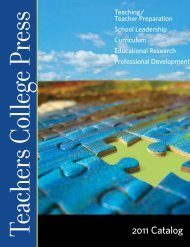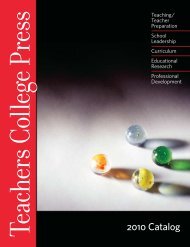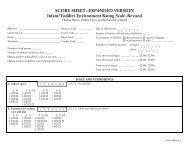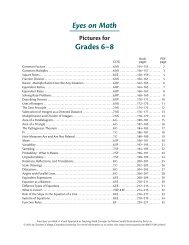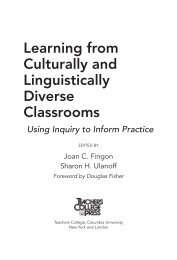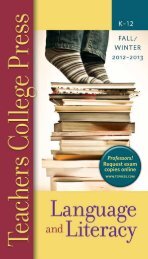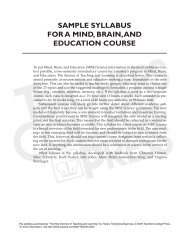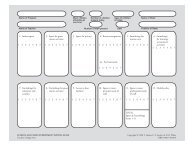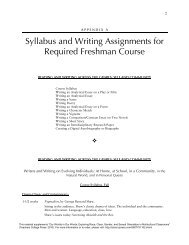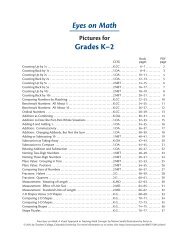Spectacular Things Happen Along the Way - Teachers College Press
Spectacular Things Happen Along the Way - Teachers College Press
Spectacular Things Happen Along the Way - Teachers College Press
Create successful ePaper yourself
Turn your PDF publications into a flip-book with our unique Google optimized e-Paper software.
you question your practice in this way? How does your reflective practice<br />
compare to his? What new reflective habits might you adopt?<br />
4. Pick a <strong>the</strong>orist that offered Schultz direction (e.g., John Dewey, Paulo Freire,<br />
Joseph Schwab, or Lisa Delpit), study his/her work, and write on how his/her<br />
<strong>the</strong>ories may impact your classroom practice.<br />
5. Develop a teacher reflection group in which you work to articulate your teaching<br />
goals and values. Compare <strong>the</strong>m to those that emerge for <strong>the</strong> o<strong>the</strong>r members of<br />
your group and those that guided Schultz’s practice.<br />
6. When a colleague critiqued Schultz’s work, he asked her to help him address her<br />
concern (p. 132). Consider how you respond to conflict in reference to your<br />
teaching. Write a dialog between yourself and one of your teaching colleagues in<br />
reference to an issue on which you have differing views.<br />
7. Create a teacher research project to help you understand <strong>the</strong> way your practices<br />
shape <strong>the</strong> experiences of your students. You can base this research project around<br />
a social action project. Use <strong>the</strong> following steps to guide your work:<br />
i. Create two to three research questions that represent what you<br />
want to find out about your classroom.<br />
ii. Determine what sources of data you will collect to answer your<br />
questions.<br />
iii. Collect this data.<br />
iv. Analyze <strong>the</strong> data by finding common <strong>the</strong>mes that address <strong>the</strong><br />
research questions.<br />
v. Propose how your analysis will impact your future teaching.<br />
Studying Classrooms in Action<br />
An intriguing documentation of an urban classroom, <strong>Spectacular</strong> <strong>Things</strong> <strong>Happen</strong> <strong>Along</strong><br />
<strong>the</strong> <strong>Way</strong> offers students and researchers a study to consider when designing <strong>the</strong>ir own<br />
research agenda or analyzing broad educational trends. This section presents activities<br />
that can help readers explore how <strong>the</strong> social action curriculum reflects <strong>the</strong>mes in<br />
American educational history and <strong>the</strong> <strong>the</strong>oretical and methodological underpinnings of<br />
research design. Also, <strong>the</strong>se exercises prompt discussions about <strong>the</strong> presentation of <strong>the</strong><br />
study itself.<br />
Focus Question: How does this case relate to broader trends in American schooling and<br />
what research and writing practices informed its emergence?<br />
1. Create a concept map or diagram showing how <strong>the</strong> social action project in Room<br />
405 compares to o<strong>the</strong>r events in American educational history. What patterns<br />
does it perpetuate? What patterns does it question? For example, Schultz is<br />
dedicated to questioning norms of cultural reproduction, “where <strong>the</strong> norms and<br />
values of a particular group’s previous generations are repeated,” explained on p.<br />
This Guide accompanies “<strong>Spectacular</strong> <strong>Things</strong> <strong>Happen</strong> <strong>Along</strong> <strong>the</strong> <strong>Way</strong>” (<strong>Teachers</strong> <strong>College</strong> <strong>Press</strong>: 2008).<br />
For more information or to order, please visit: http://store.tcpress.com/0807748579.shtml



